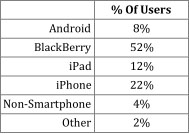
It’s interesting to look at the smartphone choice our users have made across different markets. We conducted a mobile survey a couple of weeks ago and found that a BlackBerry is still a necessity in the corporate environment, but often not enough. However, our survey results are contrary to the latest consumer survey that shows Android surpassing Apple iOS and the Blackberry platform in market share.
While we are developing the FirstRain mobile application, our survey showed that among the users surveyed they have an average of 1.2 devices each – and when we broke it down by device to find that 14% of the BlackBerry users were also using an additional device. We suspect this is because while BlackBerry may be mandated by many firms it simply does not have the app support and so is not as useful and fun outside of the standard corporate apps like email and calendars.
  FirstRain Corporate Survey February 2011 |
What does this mean for RIM? Research in Motion first introduced the BlackBerry in 1999, and 12 years ago the BlackBerry was able to hold its own— a strong operating system, stable, reliable—all the works. With the highly anticipated BlackBerry 6 OS debuting with the Torch, BlackBerry users can keep up with the competition—right?
The BlackBerry Torch does have all new features—upgraded camera, proper touch screen, security features, built-in GPS, universal search, and perhaps most favored by IT — the administrative control available. But is this enough to keep up with personal and work demands?
We found that for our users, the BlackBerry as a smart device is not cutting it. The app development has been slow for the BlackBerry OS, and the functionality of the apps are not up to par. If 14% (and growing) of our users need a second device, usually an iPad or iPhone, to maintain the quick pace of the workday, the Torch will not salvage RIM as a business-friendly product.
If 2011 is the year of the enterprise app, then this may be the beginning of the end for RIM. The BlackBerry has not made substantial enough strides to maintain functionality with all of the “super apps.” Salesforce already has 20,000 companies that have embraced their new Chatter mobile app, and it is no surprise that more than 50% of the workforce is using mobile devices as their new desktop. With more companies shifting towards app development, including FirstRain, maybe there is a reason that so many of our users who utilized BlackBerry’s also needed a supplemental device.
It is also quite hard for the BlackBerry OS to compete against the prominently featured “fun” iOS system. The iPhone is becoming so deeply embedded in our business culture, that it is seen as a necessity and the new iPad 2 is going to continue Apple’s overwhelmingly dominant control of the tablet market. Businesses like Juniper and Good.com are thriving with more consumers bringing their mobile devices into work (that now need additional security). In October, Good Technology released their first quarterly data report— illustrating how the rapid adoption of iOS is revolutionizing enterprise mobility and how they are benefiting from the move away from the Blackberry.
Whether this means more good news for Apple’s iOS and Google’s Android, or a meek future for RIM, one can’t be sure—but it is clear modern users will now demand competitive apps on their primary handheld device.
